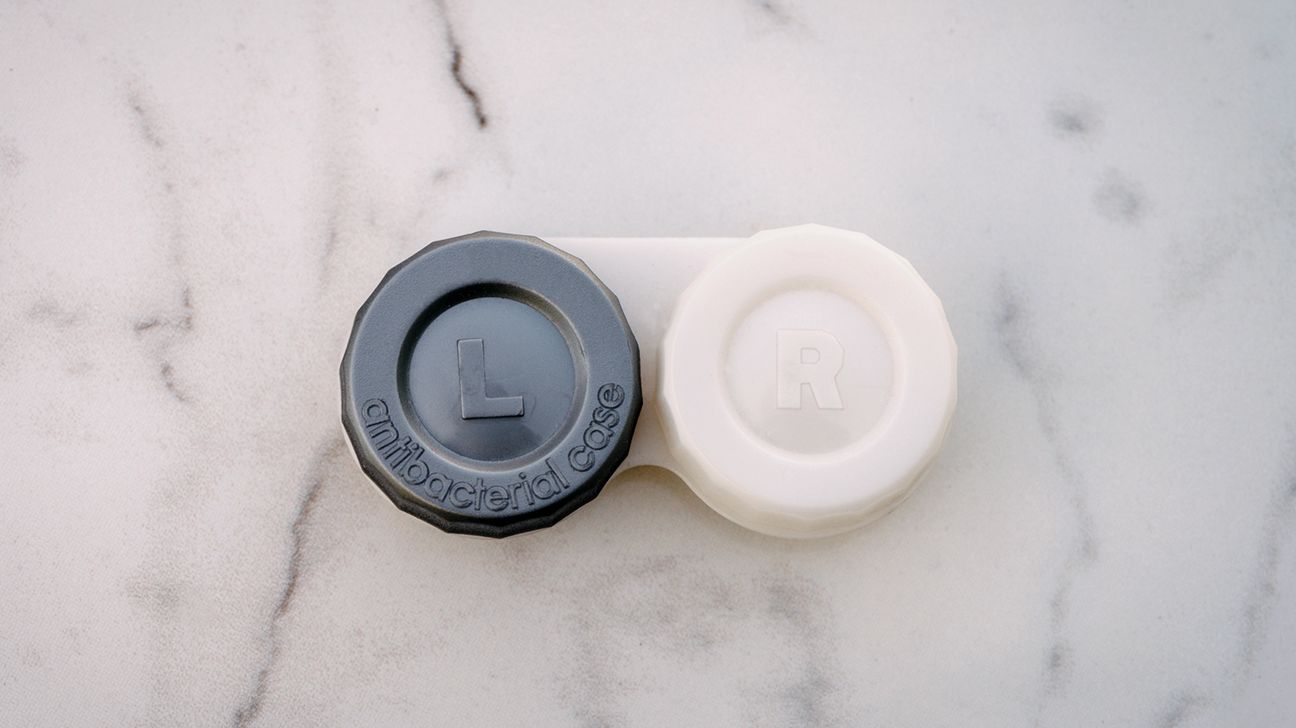It’s all in the eyes. And if you snooze with your contacts in, “it” might refer to armies of bacteria waiting to wreak havoc.
We know we shouldn’t fall asleep in our contacts. But, like “accidentally” eating two jars of expired pesto or “accidentally” watching 4 hours of people reviewing takeout food on YouTube, sometimes it just happens.
Late nights happen. Naps happen. Getting home from the club and waking up upside down in your laundry basket happens. And you started wearing contacts to get away from the hassle of glasses, right?
So why do you have to think about anything before bed except sleep and how they ruined the final season of “Game of Thrones”?
Well, after hearing news reports of people going blind as a result of catching 40 contact-lens-adorned winks, we thought it would be a good idea to look into the science behind any possible risks.
Any readers who have not yet gone contactless, allow us to guide you through one of your most important bedtime rituals.
The manufacturers of some contact lenses market them as being meant for extended, continuous, or overnight wear. But wearing any type of contact lens while catching Zzz’s could be bad news.
Your corneas get oxygen solely from the air. That means when you put in contacts, your eyes get a bit less oxygen. And when you close your eyes, the supply gets even lower.
Combining lenses and closed eyes during sleep can bring oxygen down to critical levels, according to early research.
The swelling is just enough to let gaps appear between your eye’s surface cells. This is where bacteria can sneak in. The only thing worse than infectious bacteria is infectious ninja bacteria.
Letting bacteria go glamping in your eyes overnight may make an eye infection one of your things to worry about that week.
The CDC suggests that sleeping in your contacts increases your risk of developing a nasty-sounding infection called microbial keratitis by six to eight times.
And according to research from 2014, adolescents and young adults have the highest risk of infection from contact lenses.
If there are any bacteria on your lenses, especially lenses that have seen better days, you’re basically holding them right against your eye. That’s effing gross — for both you and the bacteria.
As gross and terrifying as the idea of your eyes serving as little dishes for culturing microorganisms sounds, taking a cheeky 15-minute nap should be OK, right?
Wrong. You’d be playing quite the game of risk, akin to letting your pet ferret off the leash in an active minefield.
The swelling begins immediately and continues as long as your eyelids stay closed. The longer you sleep (say, a full 8 hours versus 15 minutes), the more likely your metaphorical ferret is to hit a landmine.
Or, more realistically, you develop an eye infection. Which is far worse, seeing as the ferret is fictional and your eyes are not.
Plus, if you have to peel those dry lenses from your parched eyes, you run the risk of further irritation or damage.
If you accidentally fall asleep with contacts in and pick up on any of the following symptoms, chat with an eye specialist as soon as you can:
- pain or discomfort
- increased sensitivity to light
- redness
- vision changes
- more tears and discharge
Wearing contacts overnight might mean you can never wear them again.
The lenses block oxygen from entering your eyes, which can make your eyes thirstier than the guy sliding into your DMs right now. They may develop new veins that trigger inflammation. (Your eyes, not the guy — a quick deployment of the “block” button can sort that out.)
This inflammation can mean a doctor can’t fit you for new contact lenses. In less severe cases, the lenses may fit poorly and cause discomfort. It’s not all that peachy either way.
Sleeping in contacts can also lead to ulcers in your eyes. If these erupt, surgery may be the next port of call. If you winced reading that, you’re correct, by the way.
Just drag yourself to the bathroom and take them out. We know your bed is warm. It’ll still be warm in 45 seconds.
Sticking to good contact lens hygiene and practices is nothing to blink at. The American Optometric Association, which is made up of people who surely know their eyes from their elbows, suggests these steps for good contact lens hygiene:
- Wash and dry your hands before touching contact lenses.
- Carefully follow your eye doctor’s instructions for cleaning.
- Keep lenses in their storage case when you’re not using them.
- Use only doctor-recommended products to clean your lenses.
- Avoid saline solutions and rewetting drops when cleaning lenses.
- Follow the lens replacement schedule closely, and don’t use lenses for longer than your doctor suggests.
- Remove them before entering a body of water, like a swimming pool or hot tub.
- Get regular eye exams to discuss your contact lenses.
Did we also mention not sleeping in them? Because that’s also a thing.
Your eyes will thank you for giving them a chance to rest, and they may buy you waffles in gratitude. (The latter scenario is unlikely, but it’s always worth holding out hope where waffles are concerned.)
You can ask your doctor about lenses the FDA has approved for overnight wear. But these can also lead to infection, so it is best not to make a habit of using them. They’re still better for you in those situations where you physically cannot stay awake.
Prying out a stubborn or dry contact lens might scratch your cornea, leaving lasting damage on top of any that occurred during sleep. If you absolutely must sleep in your lenses (long flights, unexpected sleepovers, the final season of “Game of Thrones,” that kind of thing), remember to flood your eyes with drops when you wake up.
Hands off the contacts until then.


